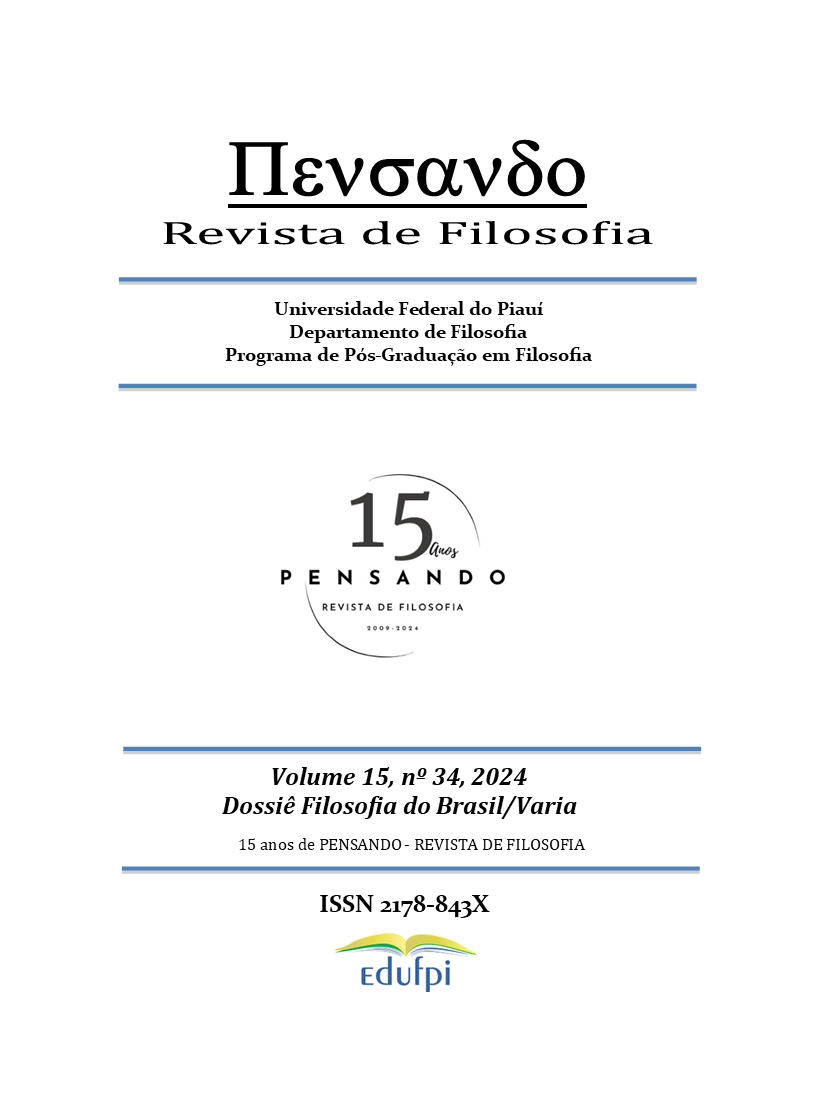Paulo Freire and his philosophical anthropology in decolonial key
DOI:
https://doi.org/10.26694/pensando.vol15i34.5545Keywords:
Paulo Freire, Philosophical Anthropology, Human being, DecolonialityAbstract
This work presents a panorama of Paulo Freire's philosophical anthropology from a decolonial analysis, aligning what the philosopher understands about who the human being from some of his works is, reflecting on his philosophical anthropology in decolonial key. The work demonstrates that although Freire is not chronologically linked to decolonial epistemology, his idea of human being and the world subverts the Eurocentric view of these philosophical categories. The objective of this work lies in the sphere of understanding if Freire undertakes efforts in an attempt to unveil the logic of coloniality present in his investigation and his analysis of the human being or not. Studying the philosopher's thinking, it is possible to put his perspective on unveiling the reality and the strength of ideology in the constitution of the human being, due to this, the relations of oppression. Freire, in his writings, gives voice to the oppressed people and subverts colonial concepts of human being and world. Finally, pursuing the above objective, it was possible to delimit Freire's answer to the question “who is the human being”: the human being is unfinished, inconclusive and seeking the finish; It is being of the praxis: of reflected action, work and transformation of the world; It is being of decision and dialogue; It is being historical and (re) creator of culture. These characteristics that make up the idea of human being in Freire have been explained throughout the text and justify the study in decolonial key, as Freire deconstructs the Eurocentric perspective of human being as an object of analysis and as a finished being.
References
ANZALDÚA, Gloria. Borderlands/La Frontera: The New Mestiza. San Francisco: Aunt Lute Books, 1987.
BARALDI, Sandro Adrián. As origens do patriarcado segundo Humberto Maturana. Revista Cactácea, v. 02, n. 04, 2022, p. 98-107. Disponível em https://rgt.ifsp.edu.br/ojs/index.php/revistacactacea/article/view/42
BARALDI, Sandro Adrián. Atos decoloniais, a única maneira de enfrentar a contradição opressores-oprimidos. Revista Cactácea, v. 03, n. 08, 2023, p. 98-110. Disponível em https://rgt.ifsp.edu.br/ojs/index.php/revistacactacea/article/view/87
FREIRE, Paulo. Educação como prática da liberdade. São Paulo: Paz e Terra, 2019.
FREIRE, Paulo. Educação e mudança [recurso eletrônico] Rio de Janeiro : Paz e Terra, 2013.
FREIRE, Paulo. Educação e mudança. Rio de Janeiro: Paz e Terra, 1982.
FREIRE, Paulo. Extensão ou comunicação? Rio de Janeiro: Paz e Terra, 2022.
FREIRE, Paulo. “Papel da educação na humanização”. Textos Marginais. Porto/1974.
FREIRE, Paulo. Pedagogia da autonomia: saberes necessários à prática educativa. São Paulo: Paz e Terra, 1996.
FREIRE, Paulo. Pedagogia do oprimido. Rio de Janeiro: Paz e Terra, 2015.
FREIRE, Paulo. Professora, sim; tia não: cartas a quem ousa ensinar. São Paulo: Olho d'Água, 1997.
LORIERI, Marcos A. Filosofia e educação: um entendimento possível desta relação. Revista @mbienteeducação. São Paulo, v. 3, n. 2 (2010). Disponível em: https://publicacoes.unicid.edu.br/index.php/ambienteeducacao/article/view/152 .
MALDONADO-TORRES, Nelson. Sobre la colonialidad del ser: contribuciones al desarrollo de un concepto. In: CASTRO-GÓMEZ, Santiago y GROSFOGUEL, Ramón (compl). El giro decolonial: reflexiones para una diversidad epistémica más allá del capitalismo global. Bogotá: Siglo del Hombre Editores; Universidad Central, Instituto de Estudios Sociales Contemporáneos y Pontificia Universidad Javeriana, Instituto Pensar, 2007, p. 127-168.
MARCONDES, Ofélia Maria. Paulo Freire: por uma educação amorosa! Revista Cactácea, v. 02, n. 04, 2022, p. 56-68. Disponível em https://rgt.ifsp.edu.br/ojs/index.php/revistacactacea/article/view/40
MARCONDES, Ofélia Maria. Paulo Freire: panorama histórico-filosófico. Revista Cactácea, v. 02, n. 05, 2022, p. 16-29. Disponível em https://rgt.ifsp.edu.br/ojs/index.php/revistacactacea/article/view/48
MARCONDES, Ofélia Maria. Refletindo sobre giro epistemológico decolonial em educação. Revista Cactácea, v. 03, n. 07, 2023, p. 12-22. Disponível em https://rgt.ifsp.edu.br/ojs/index.php/revistacactacea/article/view/71
MIGNOLO, Walter. Desobediencia epistémica: retórica de la modernidad, lógica de la colonialidad y gramática de la descolonialidad. Ciudad Autónoma de Buenos Aires: Del Signo, 2014.
QUIJANO, Aníbal. “Colonialidad y modernidad / racionalidad”. Perú Indígena (Lima), Vol. 13, N° 29, 1992.
SAVIANI, Dermeval. Educação: do senso comum à consciência filosófica. São Paulo: Cortez: Autores Associados, 1980.
SEVERINO, Antônio Joaquim. A filosofia da educação no Brasil: esboço de uma trajetória. In: GHIRALDELLI Jr., P. (Org.). O que é filosofia da educação?. 3. ed. Rio de Janeiro: DP&A, 2002. p. 265-326.
Published
How to Cite
Issue
Section
License
Copyright (c) 2024 PENSANDO - REVISTA DE FILOSOFIA

This work is licensed under a Creative Commons Attribution 4.0 International License.

























